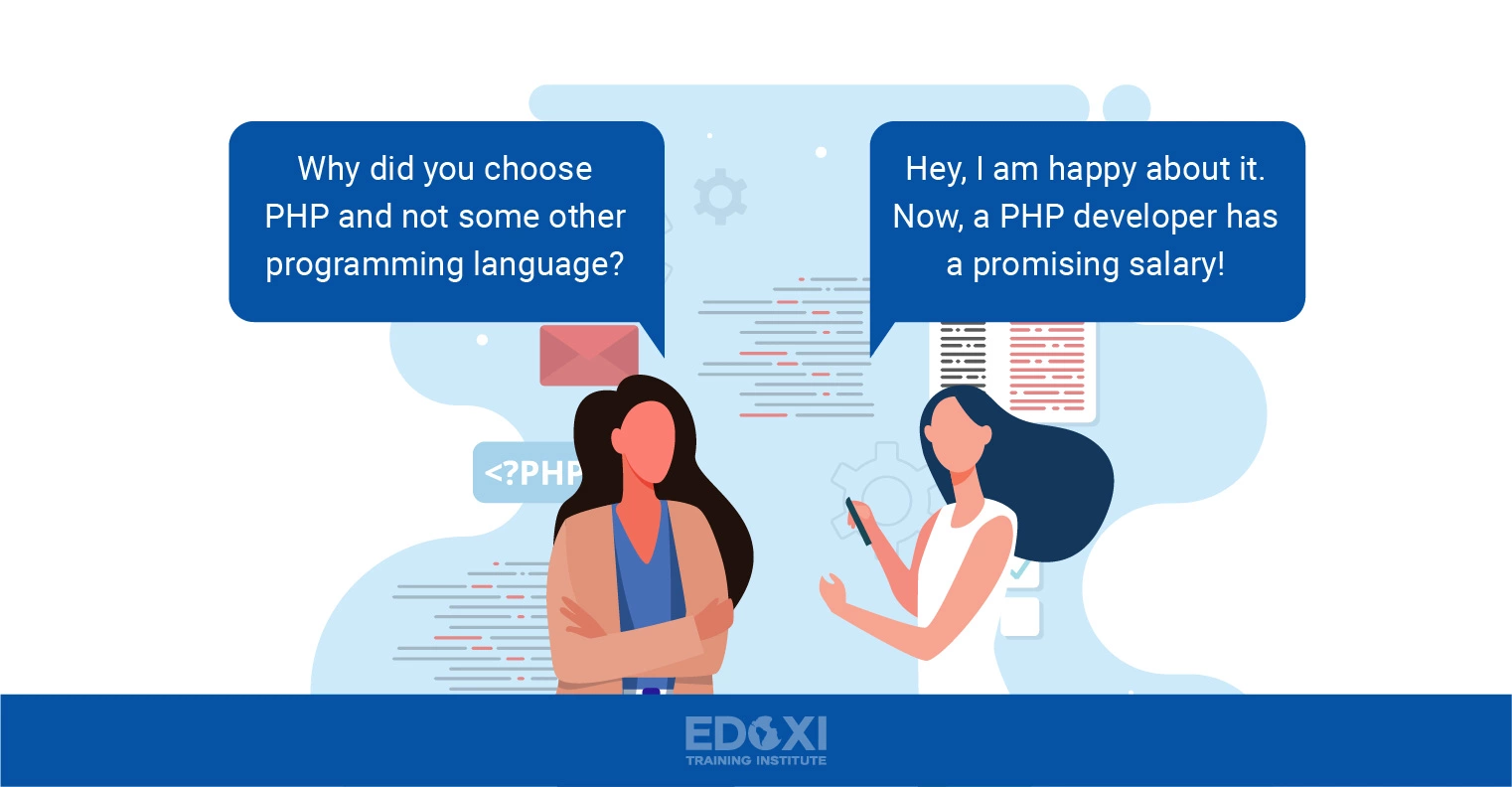
PHP is one of the most popular and comprehensive web development scripting languages. Since the inception of the internet and websites, PHP has been there for the back-end of websites, databases, servers, and web applications. Do you know in every ten websites that you visit on the internet, eight are scripted in PHP? According to a popular Web Technology Survey by W3Techs, over 79% of websites are in PHP. Major websites such as Facebook, Wikipedia & many others leverage PHP.
PHP is a high-performance language that is better than ever, thanks to its 7.X release series. It is the high speed and flexibility that has led to the never-ending popularity of PHP. Over 5.5 million developers around the world use PHP web programming language. Becoming a PHP developer can open your doors to various professional avenues. When compared to other languages such as JSP or ASP, PHP has a shorter learning curve. Therefore, with the right and minimalistic skills, you can jump in and kickstart your career as a PHP developer.
Let's move ahead and understand how you can ace PHP development goals and create products that matter :Here are the steps to becoming a PHP developer,
As your first step towards becoming a PHP developer, often people start straightway learning PHP and its associated concepts. However, this shouldn't be your first step towards learning. One should allocate some time to learn HyperText Markup Language (HTML) & Cascade Style Sheet (CSS) before jumping on to PHP. The goal here is to build the foundation which can kickstart your PHP goals like nothing else.
HTML is a markup language. Hence, you can learn about all the elements of a web page, its functionality & working. Since you can't program features with a markup language (HTML), this leaves a void. This is where PHP comes to fill the gap. The approach will help you understand the significance and right usage of PHP rather than mugging up the concepts. One can get a good grip over HTML and CSS in a couple of days.
Now that you have a basic understanding of HTML and web page elements, you can start writing code in PHP. The primary step can be starting with core functions, classes, and other functionalities of the PHP language. When it comes to implementing something fairly common, there is a high probability that PHP already has a corresponding Class or Function available. Therefore, before creating your custom functions, you should check for functions provided by the language.
For example, there is no need to create a custom module to remove all whitespaces from a string. You can use trim(), and PHP will take care of the rest. Apart from core functions & classes, you may learn about PHP data types, general syntax, OOP concepts, and databases. PHP handles significant backend operations that majorly include to and fro interactions with multiple databases. MySQL is the most popular database that devs use with PHP.
Read Also: How to learn python programming language easily?
If you wish to make learning more effective and become an efficient PHP developer without wasting time, you should indulge in active learning rather than passive. Passive learning is watching, reading, or listening about the subject matter without needing to delve deep. You can enroll in PHP Training in Dubai and achieve daily PHP language learning to boost your goals.
The training has significant value and helps you add another feather to your tech stack, real quick. Since PHP is natively a web technology, once you start learning the language, you'd be able to create simple projects and put them live on the internet. The practice is a game-changer in terms of learning. The more you regularly study, grasp information, implement, and deploy, the better PHP developer you become!
LAMP or Linux, Apache, MySQL, and PHP is a technology stack. LAMP is used by millions of developers around the world. The stack is used to create high-performance web applications. Linux is the operating system, Apache is the web server, MySQL is the open-source database, and PHP, as we know, is the programming language used to govern all of these. As a developer looking to make big in the industry, you must grab the LAMP stack basics in the early stages. Further, you can master all Four pillars for success.
Every web application is knitted from scratch to production through some technology stack. In the purview of PHP, the LAMP stack is everywhere these days. LAMP features a classic layered architecture that makes web development simple, boosts code readability, and ensures higher maintainability, just like design patterns. It is the PHP-enabled LAMP stack that allows developers to handle not only static web pages but dynamic ones too.
To become a good PHP developer you must follow the industry-accepted practices. For starters, if you wish to write clean, subtle, and error-free code, you must use PSR-12 or PHP Standard Recommendations. PSR-12 is a PHP coding standard that is used by the likes of Magento and Laravel. The practice covers everything from syntax, line length, methods, structures to popular coding methods.
Another effective practice is to use a Composer. Composer is a dependency manager that is a valuable tool in big projects. Often devs use several libraries in their code. Composer enables downloading installation, and update of these libraries a piece of cake. Dependency management is a critical aspect that needs to be catered to. This avoids conflicts at multiple levels of application development. You may search for the best PHP practices and inculcate the same in your codebase for effective PHP development.
Read Also: Top Skills Needed For a Java Developer
A PHP developer is responsible for establishing and guiding the architecture of the website. Right from formulating effective, engaging, responsive design and turning it into a working plugin or theme, PHP developers do it all. Not to forget, the developer also manages website hosting, domain name renewals, maintaining website security, email configuration, and installation.
PHP developments ensure the high-performance and maximum uptime of the website at all times. The above points can help you kickstart your career as a PHP developer. Both- job outlook and salary of a PHP developer are promising. With the ever-growing PHP websites and related market, we can say PHP holds significant potential for growth.

Professional IT trainer with extensive experience in training and project management. He is an expert in designing training courses with technical content and real-time examples. He is effective in imparting knowledge through superior verbal communication skills and active listening style. He has proven success record in utilizing cutting-edge technology to devise training exercises for all types of learners. By Academic, he is a Mechanical Engineer and also developed his skills in programming. His 25 years of teaching experience have brought in thousands of students across the world.
